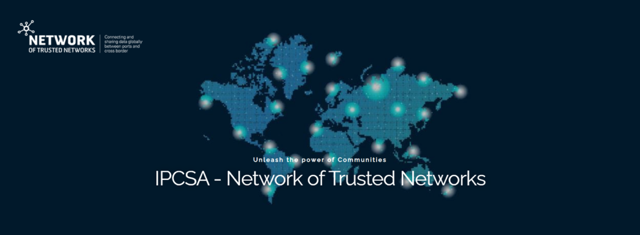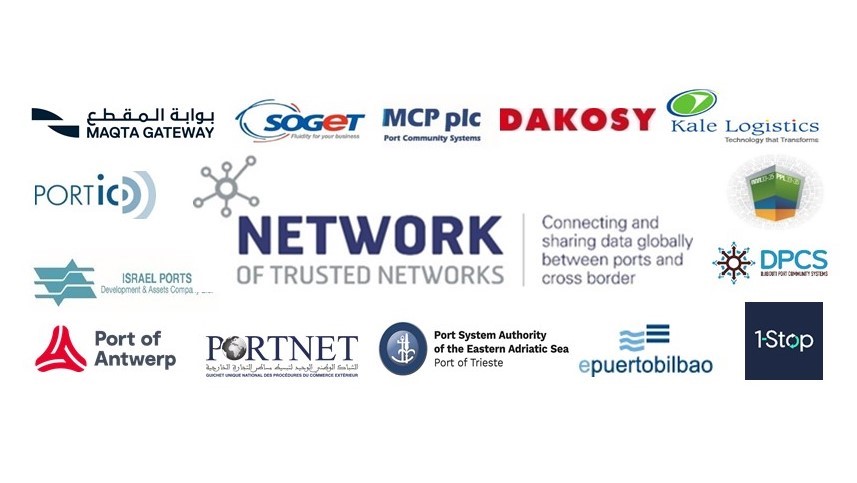Network of Trusted Networks
Breaking through barriers in the supply chain – Connecting Port Community Systems and Single Windows around the world
The International Port Community Systems Association (IPCSA) launches the Network of Trusted Networks (NoTN) a new, secure port-to-port and cross-border data exchange solution.
An innovative new concept for enabling port-to-port and cross-border exchange of data is being trialled by the International Port Community Systems Association (IPCSA) – in a two-year project covering up to 70 ports, ten airports and multiple inland terminals.
- The purpose – to provide predictability, visibility and certainty within the supply chain.
- The priority – to respond to the requirement of consumers and logistics companies for real-time, end-to-end information on their shipments.
- The unique advantage – a trusted and neutral solution.
When it comes to providing this kind of cross-border solution, others have tried to deliver such a concept – but the key stumbling block is always ‘trust’. Where others are aiming to get direct users on board, IPCSA’s Network of Trusted Networks (NoTN) takes a different approach. NoTN users will be trusted, neutral platforms such as Port Community Systems, Cargo Community Systems and Single Window operators.

“It is a trusted network because it isn’t going to the ‘end user’,” says IPCSA chairman Hans Rook. “The user is already identified and authenticated by the network. The platforms will only share data that they are allowed to share by their user.
Thus the NoTN maintains the principle of commercial confidentiality, which is the cornerstone of Port Community System and Single Window operators.
“The benefits will be for the end-user. For example, if you have a shipment coming from Morocco into a UK port, you will be able to find out through your PCS whether your container has been loaded on the vessel, when it departed and when it is estimated to arrive in the UK port.”
The NoTN is being launched as a two-year proof-of-concept project, with 14 IPCSA members taking part in the pilot.
“IPCSA and its members has been considering how best to enable port-to-port and cross-border information,” says IPCSA secretary general Richard Morton. “We have clearly identified that not all the problems are technical. In fact, some of the biggest problems are legal agreements between parties.
“In our daily lives we think nothing of downloading and using Apps – we considered how we could use this model for simplifying the exchange of information. This is what IPCSA is addressing in its proof-of-concept NoTN. The aim is to create simple cross-border exchanges and enable transparency through the supply chain.”
The two-year proof of concept will involve members learning and assessing value user cases, he explains. “We have 14 IPCSA members from across the world taking part in the initial phase are. Between them, they cover 70 ports, ten airports and multiple inland terminals.”
In the initial phase, IPCSA is creating and building the concept based on the two ‘Track and Trace’ APIs it has developed for vessel status and container status. The system, always restricted to platform-to-platform, also provides for standardised and simplified contractual arrangements and transparent fee negotiation between the ports or PCSs. No data is stored, and all data is encrypted.
“The whole concept is driven by the platforms – not by IPCSA, which remains the completely neutral facilitator between them,” says Richard Morton. “The proof of concept is looking at how this develops, and we will evaluate and refine as needed.”
In the past, PCSs have generally only operated in their ‘local’ environment, supporting their direct customers, to simplify trade flow, he says. “IPCSA’s NoTN gives them the opportunity to extend their service to give more information from different points in the supply chain, thereby enhancing their value. For the end user, it is all about transparency and knowing where your container is.”
The technical provider for the NoTN proof of concept is API first, data sharing platform NxtPort. As the facilitator, IPCSA has tailored the NxtPort offering to suit the neutrality of the NoTN initiative.
Hans Rook says: “The objective is to set up a neutral, global, scalable and collaborative solution among PCSs, to share and exchange data port-to-port and cross-border and to simplify the associated administrative and technical solutions. We are very excited about the concept; by using existing technology to link IPCSA members, we will enable them to share data for the benefit of the whole supply chain.”
 Network of Trusted Networks – Initial Phase members
Network of Trusted Networks – Initial Phase members
https://notn.ipcsa.international
MCP Plc, Felixstowe, United Kingdom
SOGET, Le Havre, France
Kale Logistics, Mumbai, India
PPL 33-35, Odessa, Ukraine
Djibouti PCS, Djibouti
DAKOSY
Israel Port Community System
https://www.israports.co.il/en/Pages/default.aspx
Maqta Gateway, Abu Dhabi, U.A.E
PORTIC, Barcelona, Spain
Port of Antwerp, Belgium
PORTNET, Morocco
Port of Trieste, Italy
www.porto.trieste.it
epuertobilbao, Bilbao, Spain
www.bilbaoport.eus/en/services/e-puertobilbao
1-Stop, Australia
Contact
Nico De Cauwer, Secretary General, IPCSA








